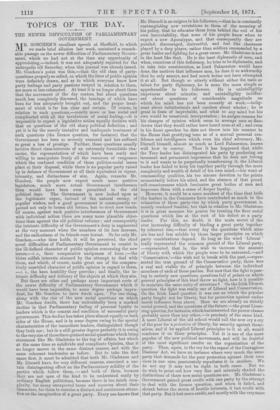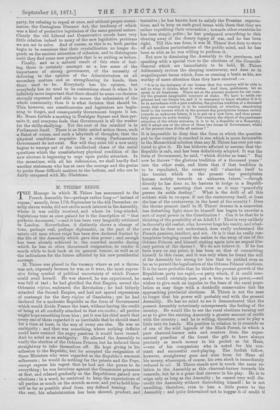TOPICS OF THE DAY.
THE NEWER DIFFICULTIES OF PARLIAMENTARY GOVERNMENT.
MGOSCHEN'S excellent speech at Sheffield, to which 1. we made brief allusion last week, contained a remark- able passage on the newer difficulties of Parliamentary Govern- ment, which we had not at the time any opportunity of appreciating,—indeed, it was not adequately reported for the metropolis till Saturday, when this journal was already issued. Mr. Goschen's point was this,—that the old class of party- questions properly so called, on which the lines of public opinion were definitely drawn, and as to which everyone knew how party feelings and party passions swayed in relation to them, are more or less exhausted. At least it is no longer about them that the movement of the day centres, but about questions much less completely discussed, the bearings of which have been far less adequately brought out, and the proper treat- ment of which is far less clear and certain. Of course, in relation to such questions,—mostly more or less social and complicated with all the involutions of social feeling,—it is impossible to expect a legislative action equally decisive with that on questions of the old sharp political definition ; and yet it is for the merely tentative and inadequate treatment of such questions (the licence question, for instance) that the Government has been so severely censured and has suffered so great a loss of prestige. Further, these questions usually involve direct class-interests of an extremely formidable cha- racter, the representatives of which have been ready and willing to manipulate freely all the resources of vengeance which the confused condition of these politico-social issues place at their disposal, while there is no popular party raised up in defence of Government at all their equivalent in vigour, intensity, and distinctness of aim. Again, remarks Mr. Goschen, the people now expect much more positive legislation, much more actual Government interference than would have been even permitted in the old political days. The Government is now looked upon as the legitimate organ, instead of the natural enemy, of popular wishes, and a good government is consequently ex- pected not only to loosen old fetters, but to rivet new bonds. Of course, against such positive interferences of Government with individual action there are many more plausible objec- tions than against the old political reforms; • and consequently the intrinsic difficulty of the Government's duty is augmented at the very moment when the numbers of its foes increase, and the enthusiasm of its friends runs lowest. So far only Mr. Goschen,—who thus holds, it will be perceived, the chief novel difficulties of Parliamentary Government to consist in the ill-defined character of public opinion concerning the new issues,—i, e., their comparative unripeness of form ;—the bitter selfish interests alarmed by the attempt to deal with them, and which, of course, make great use of the compara- tively unsettled character of public opinion in regard to them,
e., the keen hostility they provoke ; and finally, the in- trinsic difficulty and delicacy of the objects at which they aim.
But there are other and perhaps more important roots of the newer difficulty of Parliamentary Government which it would have been impossible, to some degree perhaps impru- dent, for Mr. Goschen to have dwelt upon. For one thing, along with the rise of the new social questions on which Mr. Goschen dwells, there has undoubtedly been a marked decline in that Parliamentary feeling of personal loyalty to leaders which is the cement and condition of successful party government. This decline has taken place almost equally on both sides of the House, and is in some degree owing to the special characteristics of the immediate leaders, distinguished though they both are ; but in a still greater degree probably it is owing to the very rise of those finer-grained social questions which bring statesmen like Mr. Gladstone to the top of affairs, but which at the same time so subdivide and complicate Opinion, that it no longer moves in the same distinct masses, and with the same coherent tendencies as before. But to take the first cause first, it must be admitted that both Mr. Gladstone and Mr. Disraeli have, for very different reasons, exercised a cer- tain disintegrating effect on the Parliamentary solidity of the parties which follow them, — and both of them because they are not men of the kind to be understood easily by ordinary English politicians, because there is too much com- plexity, too many unexpected turns and nuances about their characters, for them to exercise a distinct and continuous attrac- tion on the imagination of a great party. Every one knows that Mr. Disraeli is an enigma to his followers,—that he is constantly contemplating new revelations to them of the meaning of his policy, that he educates them from behind the veil of his own inscrutability, that none of his people know when to. expect a new Apocalypse, and that consequently they are puzzled, discouraged, distrustful, and feel like chessmen played by a deep player, rather than soldiers commanded by a great leader and fighting for a great cause. Mr. Gladstone is not in the least like that. He is the least diplomatic of men, and when, conscious of this deficiency, he tries to be diplomatic, and to take into consideration, as Lord Palmerston would have done, the motives that influence men, he does it so awkwardly that he only annoys, and had much better not have attempted. it at all. But though so utterly without either the taste or talent for party diplomacy, he is none the more simple or apprehensible to his followers. He is unintelligibly- impetuous about minutiae, and unintelligibly indiffer- ent about questions of considerable magnitude on which his mind has not been recently at work,—indig- nant about infinitesimals and careless about wholes ; he is great in feats of improbable, and what to any mind but his own would be unnatural, interpretation ; ho assigns reasons for his changes of opinion which seem to average men BO fine- drawn that they would rather have heard none at all ; and even in his finest speeches he does not throw into his manner to the House that gratifying tone as of a mutual personal con- fidence and intelligence which even his chief adversary, Mr_ Disraelihimself, almost as much as Lord Palmerston, knows.
well how to convey. Thus it has happened that while the Tory leader has disintegrated his party by producing an incessant and permanent impression that he does not belong to it and wants to be perpetually transforming it, the Liberal. leader has failed to keep his together partly through the mere complexity and wealth of detail of his own mind,—his want of commanding qualities, his too sincere devotion to the pointa momentarily before his mind, and the absence of that proud self-consciousness which fascinates great bodies of men and impresses them with a sense of deeper loyalty.
However, it would be a mere accident of the time that both the leaders in the Commons have contributed so much to the relaxation of those party-ties by which party government ist mainly rendered feasible, but that in relation to Mr. Gladstone, it is in great measure his genius for treating the finer social questions which lies at the root of his defect as a party leader. For this, no doubt, is the main secret of the ever increasing difficulty of binding a great party together by coherent ties,—that every day the questions which arise. are less and less soluble by those larger principles on whichr party combinations depend. So long as the word Liberal really represented the common ground of the Liberal party, —represented, that is, the wish to increase the amount of liberty with which the people were to be entrusted,—and
Conservative,'—the wish not to break with the past,—repre- sented the true ground of the Conservative party, there was. a real and visible tie of principle between the individual members of each of those parties. But now that the fight is pass- ing to entirely new questions, questions fall of points on which general principles of this kind throw no light, how is it possible to maintain the same unity of structure? On the Irish Church question the fight was really one of Liberal and Conservative. On the Irish Land question it was one on which the popular party fought not for liberty, but for protection against undue moral influence from above. Hero we are already on strictly- social ground, and the questions of the future,—the great Licen- sing question, for instance, whichhas interested the poorer classes probably more than any other,—is precisely of the same kind. A mere Liberal of the old school would call the new cry a cry- of the poor for a privation of liberty, for security against them- selves, and if he applied Liberal principles to it at all, would condemn it on those principles. Yet it is one of the most popular of the new political movements, and will be fruitful of the most significant results on the organization of the party. Then, again, in the cry for the repeal of the Contagious Diseases' Act, we have an instance where very much the same party that demands for the poor protection against their own vices in one case, passionately repudiates it in another. We do not say it may not be right in both cases. But we do wish to point out how very fine and minutely shaded the distinctions of those new social questions are. Mr. Gladstone's Government gained great credit with one party by the attempt to deal with the licence question, and. when it failed, and shrank before the storm of hostile interests, it lost credit with that party. But it lost more credit, and mostly with the very same
party, for refusing to repeal at once, and without proper exami- nation, the Contagious Diseases' Act, the tendency of which was a kind of protective legislation of the same general nature. Clearly the old Liberal and Conservative creeds have very little relation indeed to many of the new legislative problems we are set to solve. And of course, as this is so, both parties begin to be conscious that their crystallization no longer de- pends on the ancient attraction of cohesion, and to disintegrate until they find some new principle that is as uniting as before.
Finally, and as a natural result of this state of feel- ing, there is certainly amongst us a less sense of the importance of strong government, of the necessity of deferring to the opinion of the Administration on all secondary matters and so strengthening its hands, than there used to be. Everybody has his opinion, but everybody has no need to be contentious about it when it is infinitely more important that there should be some one decision strongly expressed and able to secure the submission of the whole community, than it is what decision that should be. This, however, our constituencies and legislators are begin- ning to forget, and consequently Government forgets it too. Mr. Bruce forbids a meeting in Trafalgar Square and then per- mits it, and everyone feels that Government is all the weaker for the shilly-shallying. Yet the root of the mischief is in Parliament itself. There is so little united action there, such a Babel of voices, and such a labyrinth of thoughts, that the physical conditions requisite for a strong Parliamentary Government do not exist. Nor will they exist till a new unity begins to emerge out of the intellectual chaos of the social questions which the unsatisfactory physical condition of the new electors is beginning to urge upon public attention, in the meantime, with all his deficiencies, we shall hardly find another statesman who has at once the courage and the genius to probe those difficult matters to the bottom, and who can be fairly compared with Mr. Gladstone.































 Previous page
Previous page